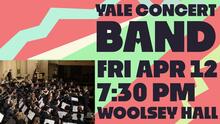Director of Bands Thomas C. Duffy celebrated his 40th year at Yale in 2022. Yale Bands alumni and friends mounted a fundraising campaign to honor him by naming an annual concert after him. Beginning in 2023 the Band’s April concert was titled “The Thomas C. Duffy Yale Concert Band Spring Concert,” as will be each subsequent Yale Concert Band Spring Concert, in perpetuity.
Thomas C. Duffy, Music Director. Program:
• “Afro-American Symphony” by William Grant Still is the first full orchestral symphony composed by an African American and premiered for a US audience by a leading orchestra, the Rochester Philharmonic Orchestra. This 4-movement wind band transcription retains the blues progressions, rhythms, and folk elements that reflect Still’s 1930s musical style.
• “New England Triptych” (William Schuman) is based on the choral music of William Billings, an early-American New England composer. Written in three sections, “Be Glad Then, America,” is noble and majestic; “When Jesus Wept” is a sensitive framing of the sacred verse; and “Chester” is the American Revolutionary hymn and marching song that served as the de facto colonial national anthem. David Mills (Director of Bands [emeritus], University of Connecticut), guest conductor.
• “In Between” (Aaron Israel Levin) takes its inspiration from movies about making movies (like Federico Fellini’s “8½” or David Lynch’s “Mulholland Drive”), where the lives of fictitious filmmakers “off-set” often become intermingled with the film they’re attempting to make. The title refers to what happens in between “takes,” and the inevitable merging of off- and on-set. (Premiere of wind band version).
• Ron Nelson’s “Medieval Suite” is an homage to three great master choral composers of the Middle Ages: Leonin (middle 12th century), Perotin (c. 1155-1200), and Machaut (c. 1300-1377).

